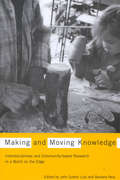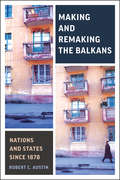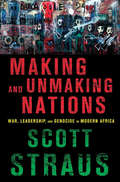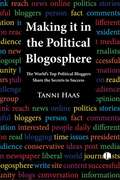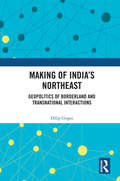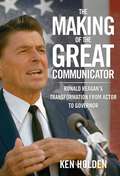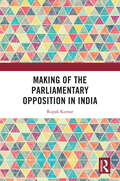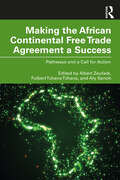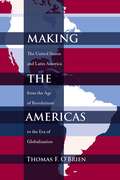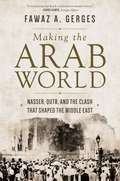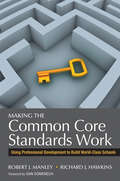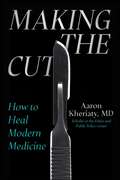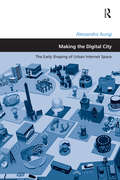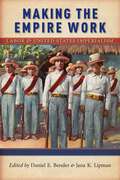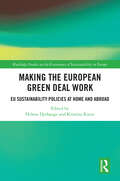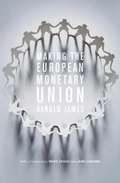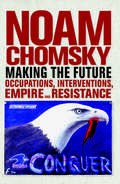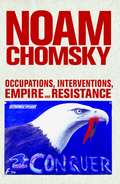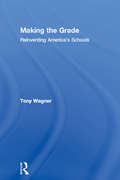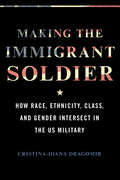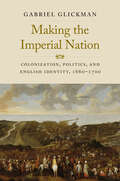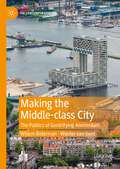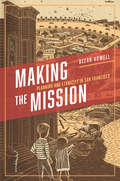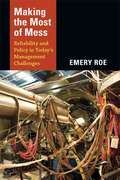- Table View
- List View
Making and Moving Knowledge: Interdisciplinary and Community-based Research in a World on the Edge
by Barbara Neis John Sutton LutzIt has been clear for some time that research does not automatically translate into knowledge, nor does knowledge necessarily translate into wisdom. Whether the immediate challenge is global warming, epidemic disease, poverty, environmental degradation, or social fragmentation, research efforts are wasted if we cannot devise efficient and understandable processes to create and transfer knowledge to policy makers, interested groups, and communities. How to maximize the impact of scholarly research and combine it with practical knowledge already available in lay communities are key issues in a world threatened with social-ecological disasters. Making and Moving Knowledge focuses directly on how knowledge is created and transferred or is blocked and atrophies. It places knowledge generated by universities and governments beside practical knowledge from coastal aboriginal and non-aboriginal communities and looks at how different kinds of knowledge flow in different directions. Concentrating on intellectually fertile spaces at the edges of disciplines and the rich socio-ecological interfaces where land meets sea, authors demonstrate their commitment to knowledge transfer in their work, showing how knowledge transfer can be considered theoretically, methodologically, and practically."
Making and Remaking the Balkans: Nations and States Since 1878 (Munk Series on Global Affairs)
by Robert Clegg AustinWith more than 25 years since the collapse of communism, the end of the wars and billions of dollars in aid, the Balkans are still characterized by corruption, state capture, and decidedly unmodern states that are often either weak or authoritarian. Taking the contemporary Balkans as a starting point, Making and Remaking the Balkans studies the region’s history combined with observations based on more than twenty years of field experience. Primarily concerned with current issues in the Balkans since 1989, this book explains why the region has endured such a prolonged and fraught transition to democracy and eventual membership in the European Union. The young and educated have largely left. Governmental crisis and economic stagnation is the norm and much-needed regional cooperation has been suppressed by renewed nationalism. Wars on corruption have proved to be largely rhetorical. Making and Remaking the Balkans offers a systematic study of the issues the entire region faces as it struggles to complete the European integration process at a time when the European Union faces bigger problems elsewhere.
Making and Unmaking Nations: The Origins and Dynamics of Genocide in Contemporary Africa
by Scott StrausIn Making and Unmaking Nations, Scott Straus seeks to explain why and how genocide takes place--and, perhaps more important, how it has been avoided in places where it may have seemed likely or even inevitable. To solve that puzzle, he examines postcolonial Africa, analyzing countries in which genocide occurred and where it could have but did not. Why have there not been other Rwandas? Straus finds that deep-rooted ideologies--how leaders make their nations--shape strategies of violence and are central to what leads to or away from genocide. Other critical factors include the dynamics of war, the role of restraint, and the interaction between national and local actors in the staging of campaigns of large-scale violence. Grounded in Straus's extensive fieldwork in contemporary Africa, the study of major twentieth-century cases of genocide, and the literature on genocide and political violence, Making and Unmaking Nations centers on cogent analyses of three nongenocide cases (Côte d'Ivoire, Mali, and Senegal) and two in which genocide took place (Rwanda and Sudan). Straus's empirical analysis is based in part on an original database of presidential speeches from 1960 to 2005. The book also includes a broad-gauge analysis of all major cases of large-scale violence in Africa since decolonization. Straus's insights into the causes of genocide will inform the study of political violence as well as giving policymakers and nongovernmental organizations valuable tools for the future.
Making it in the Political Blogosphere: The World's Top Political Bloggers Share the Secrets to Success (Making it in the Political Blogosphere)
by Tanni HaasThis title introduces readers to 20 of the world's top political bloggers, providing those bloggers with the opportunity to explain in their own words what they have done to become so successful while offering readers advice about what they can do to emulate the contributors' success. Each chapter begins with a brief profile of a blogger and their blog, followed by my interview with him or her.
Making of India's Northeast: Geopolitics of Borderland and Transnational Interactions
by Dilip GogoiThis book examines India’s Northeast borderland – strategically positioned at the confluence of South Asia, East and Southeast Asia – from the perspective of international relations. The volume interrogates the geopolitics of region-making in both colonial and postcolonial times and traces the transformation of Northeast India from a British strategic frontier into a securitised borderland. It situates the region in transnational interactions both in conflict and cooperation with its immediate neighbouring regions of China, Bangladesh, and Myanmar, especially in the context of India’s Look East/Act East policy. The volume paves the way for a new ‘region-state’ framework borne out of the constructivist worldview and offers answers to many conundrums centring border studies. It further delineates approaches to overcoming the present geopolitical and territorial challenges of India’s Northeast with a critical thrust on regional policymaking. The volume will be of interest to students and researchers in the disciplines of social sciences and humanities in India as well as South and Southeast Asia. It will be especially useful to those in politics and international relations, strategic studies, international political economy, foreign policy, development studies and regional development, besides foreign policy-makers and diplomats, development practitioners, economists and policy analysts.
Making of the Great Communicator: Ronald Reagan's Transformation from Actor to Governor
by Kenneth HoldenOne week after Ronald Reagan announced his candidacy for governor of California, the San Francisco Chronicle gibed: “It was simply a flagrant example of miscasting.” Reagan was tanking, and his businessmen backers panicked. Their bold experiment was about to fail. Then a think-tank friend suggested the expertise of two UCLA social pyschologists. Kenneth Holden and Stanley Plog agreed to take the job only if they could have three full days alone with Reagan. The candidate and his backers agreed, and the three men disappeared into a Malibu beach house. Those three days remade the bumbling neophyte into an articulate, confident politician whose devastating sound bites shredded the opposition. Holden or Plog remained by Reagan’s side for the rest of the campaign, feeding him information about California’s problems, teaching him to handle the press, writing his position papers, and helping develop the programs he offered, all while battling factions of the campaign team who seemed determine to sabotage their own man. Not everyone who voted for Reagan supported his positions, but voters preferred his honesty and forthrightness to the waffling of other politicians. Reagan won by a landslide. Holden and Plog had shaped an actor into a governor, but they were also turning a governor into a president. Here is the untold story of how they did it.
Making of the Parliamentary Opposition in India
by Rupak KumarThis book is a detailed historical and analytical account of the making of parliamentary opposition in Independent India, based on a wide range of sources, including the memoirs of politicians and their writings in the popular press. Historically, the book examines the working of the Opposition in four phases –the Formative Phase (1952-1966), the Resilience Phase (1967-1984), the Consolidation Phase (1985-1999), and the Fragmentation Phase (1999-2014); parallelly, the question of the Opposition is framed in two facets: as democracy’s necessity and as governance imperative. It shows how the representational assertion in Indian politics enabled the expansion of the Opposition, but by generating fragmentation and making ideologically-neutral coalitions both possible and necessary, it also contributed to its weakening as a mechanism of exacting accountability.This book invites the reader to reimagine the idea of democracy, political system, governance from the perspective of the opposition. Why is the Opposition essential? What is the constitutional and institutional protection to ensure an effective and vibrant opposition under one party dominant system? It also adopts a narrative style, making it accessible to all kinds of readers.This book will be useful to those interested in understanding Indian politics, democracy, political processes and institutions. Students, researchers, academics of political science, governance and policy makers will find this work engaging.
Making the African Continental Free Trade Agreement a Success: Pathways and a Call for Action
by Edited ByAlbert Zeufack Fulbert Tchana Tchana Aly SanohIn 2019, African heads of state and governments launched in fanfare the African Continental Free Trade Agreement (AfCFTA), a historic agreement for economic transformation across the continent. But now comes the hard bit: how to make the agreement a success?In this book, senior experts from across the world come together to provide a comprehensive analysis of the conditions needed for AfCFTA to successfully spur economic development in Africa. It puts forward three foundations for success: demography dividend, digital economy, and economic diversification. In addition to trade policy, the book recommends that African policymakers should strengthen fiscal and monetary policy coordination, adopt and implement the appropriate regulatory environment, and build suitable connectivity infrastructure. The stakes are high. If implemented correctly, the book argues that AfCFTA could speed up trade within Africa, which could double every five years. Success would mean growth, investment, changing trade patterns, jobs, economic transformation, poverty reduction, and a continental market for services.Driven by concrete, evidence-based strategies for long-term growth, this book is an essential read for policy makers, development practitioners, economics researchers, and everyone with an interest in the future of Africa.
Making the Americas: The United States and Latin America from the Age of Revolutions to the Era of Globalization (Diálogos Series)
by Thomas F. O'BrienAmericans' belief in their economic, political, and cultural superiority launched them on a mission to transform Latin America that has evolved into a global process of Americanization. From corporate and philanthropic initiatives to military interventions, Americans motivated by self-interest and idealism sought to reshape Latin America and gave birth to the American driven process of globalization. Synthesizing a broad range of international relations scholarship, including perspectives from gender, race, and cultural studies, O'Brien offers a sweeping history of the Americas that ranges from the adventures of eighteenth-century whaling men to the contemporary struggle over globalization. As a part of this study, the author explains how the responses of Latin Americans to Americanization have varied from the vehement rejection of U.S. economic dominance to embracing as well as reconfiguring the icons of American consumer culture. O'Brien's goal is to provide readers with a nuanced understanding of how the people of the Americas have shaped their own history, and influenced the development of U.S. economic, strategic, and cultural power in the world today.
Making the Arab World: Nasser, Qutb, and the Clash That Shaped the Middle East
by Fawaz A. GergesHow the conflict between political Islamists and secular-leaning nationalists has shaped the history of the modern Middle EastIn 2013, just two years after the popular overthrow of Hosni Mubarak, the Egyptian military ousted the country’s first democratically elected president—Mohamed Morsi of the Muslim Brotherhood—and subsequently led a brutal repression of the Islamist group. These bloody events echoed an older political rift in Egypt and the Middle East: the splitting of nationalists and Islamists during the rule of Egyptian president and Arab nationalist leader Gamal Abdel Nasser. In Making the Arab World, Fawaz Gerges, one of the world’s leading authorities on the Middle East, tells how the clash between pan-Arab nationalism and pan-Islamism has shaped the history of the region from the 1920s to the present.Gerges tells this story through an unprecedented dual biography of Nasser and another of the twentieth-century Arab world’s most influential figures—Sayyid Qutb, a leading member of the Muslim Brotherhood and the father of many branches of radical political Islam. Their deeply intertwined lives embody and dramatize the divide between Arabism and Islamism. Yet, as Gerges shows, beyond the ideological and existential rhetoric, this is a struggle over the state, its role, and its power.Based on a decade of research, including in-depth interviews with many leading figures in the story, Making the Arab World is essential reading for anyone who wants to understand the roots of the turmoil engulfing the Middle East, from civil wars to the rise of Al-Qaeda and ISIS.
Making the Common Core Standards Work: Using Professional Development to Build World-Class Schools
by Dr Robert J. Manley Richard J. HawkinsEssential reading for school leaders! Providing a blueprint for implementing and exceeding the new Common Core State Standards, this practical guide focuses on realistic strategies for lasting change within schools. The authors build an inspiring case for how individual schools can develop a world-class education system through targeted professional development. Topics include: Empowering teachers and staff as partners in implementing the new standards Adapting existing curriculum to meet grade-level goals for mathematics and language arts Designing assessments that measure mastery of the standards Ensuring that the standards benefit all students, including multicultural learners
Making the Cut: How to Heal Modern Medicine
by Aaron KheriatyThere is a cure for medicine&’s ills, but it&’s going to hurt. Effective treatment, as every doctor knows, begins with accurate diagnosis. Making the Cut is about what&’s going on in the house of medicine. Medicine got sick. One in three people now distrust the healthcare system. Following the pandemic, two-thirds of Americans doubt medical scientists will act in the best interest of the public. We are grappling with an epidemic of chronic illness—heart disease, cancer, diabetes, Alzheimer&’s, stroke, and chronic lung and kidney disease—affecting six in ten Americans, which medicine seems powerless to fix. The overall life expectancy of Americans has declined for the first time since the Great Depression. Not only are trust levels tanking, the number of doctors is dropping dramatically. Physicians are quitting in droves. One in five doctors will leave medicine in the next two years. One in three will reduce their hours. A doctor, we assume, wounds in order to heal. &“You&’re going to feel a sharp pain!&” she says, before making the cut. Today, though, all too often the doctor wounds without healing. Why? In Making the Cut, Dr. Aaron Kheriaty, one of the country's leading public intellectuals and preeminent bioethicists, reveals what medicine gave him—and what it sometimes took from him. This book is about how he grew from an overconfident pre-med to an ambivalent medical student to a capable physician who had fallen in love with medicine—even if his lover has turned into a prostitute of late. While presenting a damning diagnosis of contemporary medicine, Making the Cut also applies the wounding scalpel in order to heal it.
Making the Digital City: The Early Shaping of Urban Internet Space (Design and the Built Environment)
by Alessandro AurigiSince the late 1990s, Information and Communication Technologies (ICTs) have been hailed as a potentially revolutionary feature of the planning and management of Western cities. Economic regeneration and place promotion strategies have exploited these new technologies; city management has experimented with electronically distributed services, and participation in public life and democratic decision-making processes can be made more flexible by the use of ICTs. All of these technological initiatives have often been presented and accessed via an urban front-end information site known as 'digital city' or 'city network.' Illustrated by a range of European case studies, this volume examines the social, political and management issues and potential problems in the establishment of an electronic layer of information and services in cities. The book provides a better understanding of the direction European cities are going towards in the implementation of ICTs in the urban arena.
Making the Empire Work: Labor and United States Imperialism (Culture, Labor, History #13)
by Daniel E. Bender Jana K. LipmanMillions of laborers, from the Philippines to the Caribbean, performed the work of the United States empire. Forging a global economy connecting the tropics to the industrial center, workers harvested sugar, cleaned hotel rooms, provided sexual favors, and filled military ranks. Placing working men and women at the center of the long history of the U.S. empire, these essays offer new stories of empire that intersect with the "grand narratives" of diplomatic affairs at the national and international levels. Missile defense, Cold War showdowns, development politics, military combat, tourism, and banana economics share something in common--they all have labor histories. This collection challenges historians to consider the labor that formed, worked, confronted, and rendered the U.S. empire visible. The U.S. empire is a project of global labor mobilization, coercive management, military presence, and forced cultural encounter. Together, the essays in this volume recognize the United States as a global imperial player whose systems of labor mobilization and migration stretched from Central America to West Africa to the United States itself. Workers are also the key actors in this volume. Their stories are multi-vocal, as workers sometimes defied the U.S. empire's rhetoric of civilization, peace, and stability and at other times navigated its networks or benefited from its profits. Their experiences reveal the gulf between the American 'denial of empire' and the lived practice of management, resource exploitation, and military exigency. When historians place labor and working people at the center, empire appears as a central dynamic of U.S. history.
Making the European Green Deal Work: EU Sustainability Policies at Home and Abroad (Routledge Studies on the Governance of Sustainability in Europe)
by Helene Dyrhauge and Kristina KurzeThis book critically analyses different dimensions in the sustainable transitions outlined by the European Green Deal, focusing on both internal actions and external relations and highlighting the EU’s diverging powers and capabilities in achieving the core objectives. As with the Green Deal itself, the chapters cover different policies including financial instruments, energy policies, climate policies and external policies and apply the ideal-type logics of appropriateness and consequences to analyse sustainable transformations. The variety of the cases contribute to a broad understanding of how different actors interpret and implement the aims of the European Green Deal, including especially those lagging behind, who, for various reasons, are struggling with the sustainable transition. From examining their policies, the book illuminates the challenges and opportunities they are facing. Overall, the contributions address key questions surrounding the EU’s powers and limits in inducing transformative change and implementing the European Green Deal. This book will be of key interest to scholars, students and practitioners of EU sustainability policies, sustainability transitions and green economy, environmental studies, energy policy, energy governance and climate change, public policy, comparative politics and international relations.
Making the European Monetary Union
by Harold JamesEurope’s financial crisis cannot be blamed on the Euro, Harold James contends in this probing exploration of the whys, whens, whos, and what-ifs of European monetary union. The current crisis goes deeper, to a series of problems that were debated but not resolved at the time of the Euro’s invention. Since the 1960s, Europeans had been looking for a way to address two conundrums simultaneously: the dollar’s privileged position in the international monetary system, and Germany’s persistent current account surpluses in Europe. The Euro was created under a politically independent central bank to meet the primary goal of price stability. But while the monetary side of union was clearly conceived, other prerequisites of stability were beyond the reach of technocratic central bankers. Issues such as fiscal rules and Europe-wide banking supervision and regulation were thoroughly discussed during planning in the late 1980s and 1990s, but remained in the hands of member states. That omission proved to be a cause of crisis decades later. Here is an account that helps readers understand the European monetary crisis in depth, by tracing behind-the-scenes negotiations using an array of sources unavailable until now, notably from the European Community’s Committee of Central Bank Governors and the Delors Committee of 1988–89, which set out the plan for how Europe could reach its goal of monetary union. As this foundational study makes clear, it was the constant friction between politicians and technocrats that shaped the Euro. And, Euro or no Euro, this clash will continue into the future.
Making the Future
by Noam Chomsky"Unwavering political contrarian Noam Chomsky smart-bombs the U.S. military's global Interventions (City Lights). Shock and awe!"-Vanity FairMaking the Future presents more than fifty concise and persuasively argued commentaries on U.S. politics and policies, written between 2007 and 2011. Taken together, Chomsky's essays present a powerful counter-narrative to official accounts of the major political events of the past four years: the wars in Afghanistan and Iraq; the U.S. presidential race; the ascendancy of China; Latin America's leftward turn; the threat of nuclear proliferation in Iran and North Korea; Israel's invasion of Gaza and expansion of settlements in Jerusalem and the West Bank; developments in climate change; the world financial crisis; the Arab Spring; the assassination of Osama bin Laden; and the Occupy protests. Laced throughout his critiques are expressions of commitment to democracy and the power of popular struggles. "Progressive legislation and social welfare," writes Chomsky, "have been won by popular struggles, not gifts from above. Those struggles follow a cycle of success and setback. They must be waged every day, not just once every four years, always with the goal of creating a genuinely responsive democratic society, from the voting booth to the workplace."Making the Future is a follow-up to Interventions, published by City Lights in 2007 and banned from Guantánamo Bay by U.S. military censors. Both books are drawn from articles Chomsky has been writing regularly for the New York Times Syndicate, but which go largely ignored by newspapers in the United States. Making the Future offers fierce, accessible, timely, gloves-off political writing by one of America's foremost intellectual and political dissidents.
Making the Future: Occupations, Interventions, Empire and Resistance
by Noam ChomskyMaking the Future presents more than fifty concise and persuasively argued commentaries on U.S. politics and policies, written between 2007 and 2011. Taken together, Chomsky's essays present a powerful counter-narrative to official accounts of the major political events of the past four years: the wars in Afghanistan and Iraq; the U.S. presidential race; the ascendancy of China; Latin America's leftward turn; the threat of nuclear proliferation in Iran and North Korea; Israel's invasion of Gaza and expansion of settlements in Jerusalem and the West Bank; developments in climate change; the world financial crisis; the Arab Spring; the assassination of Osama bin Laden; and the Occupy protests. Laced throughout his critiques are expressions of commitment to democracy and the power of popular struggles. "Progressive legislation and social welfare," writes Chomsky, "have been won by popular struggles, not gifts from above. Those struggles follow a cycle of success and setback. They must be waged every day, not just once every four years, always with the goal of creating a genuinely responsive democratic society, from the voting booth to the workplace." Making the Future is a follow-up to Interventions, published by City Lights in 2007 and banned from Guantánamo Bay by U.S. military censors. Both books are drawn from articles Chomsky has been writing regularly for the New York Times Syndicate, but which go largely ignored by newspapers in the United States. Making the Future offers fierce, accessible, timely, gloves-off political writing by one of America's foremost intellectual and political dissidents.
Making the Grade: Reinventing America's Schools
by Tony WagnerThis book provides a guide for a long-overdue public dialogue about why and how we need to reinvent our nation's schools. How has the world changed for our children; what do all students need to know in light of these changes; how do we hold students and schools accountable for results; what do good schools look like; and what must leaders do to create more of these schools? These are some of the questions that drive this book. The answers emerging to these questions may surprise many. The most successful public schools of the 21st century look a lot more like our 19th century village schools than our current factory model of schooling. This book describes these "new village schools" that have been created in the last decade and suggests that they are a prototype for the schools of the future.
Making the Immigrant Soldier: How Race, Ethnicity, Class, and Gender Intersect in the US Military
by Cristina-Ioana DragomirImmigrants to the United States have long used the armed forces as a shortcut to citizenship. Cristina-Ioana Dragomir profiles Lily, Alexa, and Vikrant, three immigrants of varying nationalities and backgrounds who chose military service as their way of becoming American citizens. Privileging the trio’s own words and experiences, Dragomir crafts a human-focused narrative that moves from their lives in their home countries and decisions to join the military to their fraught naturalization processes within the service. Dragomir illuminates how race, ethnicity, class, and gender impacted their transformation from immigrant to soldier, veteran, and American. She explores how these factors both eased their journeys and created obstacles that complicated their access to healthcare, education, economic resources, and other forms of social justice. A compelling union of analysis and rich storytelling, Making the Immigrant Soldier traces the complexities of serving in the military in order to pursue the American dream.
Making the Imperial Nation: Colonization, Politics, and English Identity, 1660-1700 (The Lewis Walpole Series in Eighteenth-Century Culture and History)
by Gabriel GlickmanHow did the creation of an overseas empire change politics in England itself? After 1660, English governments aimed to convert scattered overseas dominions into a coordinated territorial power base. Stuart monarchs encouraged schemes for expansion in America, Africa, and Asia, tightened control over existing territories, and endorsed systems of slave labor to boost colonial prosperity. But English power was precarious, and colonial designs were subject to regular defeats and failed experimentation. Recovering from recent Civil Wars at home, England itself was shaken by unrest and upheaval through the later seventeenth century. Colonial policies emerged from a kingdom riven with inner tensions, which it exported to enclaves overseas. Gabriel Glickman reinstates the colonies within the domestic history of Restoration England. He shows how the pursuit of empire raised moral and ideological controversies that divided political opinion and unsettled many received ideas of English national identity. Overseas ambitions disrupted bonds in Europe and cast new questions about English relations with Scotland and Ireland. Vigorous debates were provoked by contact with non-Christian peoples and by changes brought to cultural tastes and consumer habits at home. England was becoming an imperial nation before it had acquired a secure territorial empire. The pressures of colonization exerted a decisive influence over the wars, revolutions, and party conflicts that destabilized the later Stuart kingdom.
Making the Middle-class City: The Politics of Gentrifying Amsterdam (The Contemporary City)
by Willem Boterman Wouter van GentThis book seeks to understand the urban transformation of Amsterdam over a 40-year period. In addition to charting social and economic changes associated with gentrification, it analyses the electoral dynamics and middle-class politics that have underpinned Amsterdam’s change to a middle-class city.
Making the Mission: Planning and Ethnicity in San Francisco
by Ocean HowellIn the aftermath of the 1906 San Francisco earthquake, residents of the city's iconic Mission District bucked the city-wide development plan, defiantly announcing that in their neighborhood, they would be calling the shots. Ever since, the Mission has become known as a city within a city, and a place where residents have, over the last century, organized and reorganized themselves to make the neighborhood in their own image. In Making the Mission, Ocean Howell tells the story of how residents of the Mission District organized to claim the right to plan their own neighborhood and how they mobilized a politics of place and ethnicity to create a strong, often racialized identity--a pattern that would repeat itself again and again throughout the twentieth century. Surveying the perspectives of formal and informal groups, city officials and district residents, local and federal agencies, Howell articulates how these actors worked with and against one another to establish the very ideas of the public and the public interest, as well as to negotiate and renegotiate what the neighborhood wanted. In the process, he shows that national narratives about how cities grow and change are fundamentally insufficient; everything is always shaped by local actors and concerns.
Making the Modern American Fiscal State
by Ajay K. MehrotraAt the turn of the twentieth century, the US system of public finance underwent a dramatic transformation. The late nineteenth-century regime of indirect, hidden, partisan, and regressive taxes was eclipsed in the early twentieth century by a direct, transparent, professionally administered, and progressive tax system. In Making the American Fiscal State, Ajay K. Mehrotra uncovers the contested roots and paradoxical consequences of this fundamental shift in American tax law and policy. He argues that the move toward a regime of direct and graduated taxation marked the emergence of a new fiscal polity - a new form of statecraft that was guided not simply by the functional need for greater revenue but by broader social concerns about economic justice, civic identity, bureaucratic capacity, and public power. Between the end of Reconstruction and the onset of the Great Depression, the intellectual, legal, and administrative foundations of the modern fiscal state first took shape. This book explains how and why this new fiscal polity came to be.
Making the Most of Mess: Reliability and Policy in Today's Management Challenges
by Emery RoeIn Making the Most of Mess, Emery Roe emphasizes that policy messes cannot be avoided or cleaned up; they need to be managed. He shows how policymakers and other professionals can learn these necessary skills from control operators who manage large critical infrastructures such as water supplies, telecommunications systems, and electricity grids. The ways in which they prevent major accidents and failures offer models for policymakers and other professionals to manage the messes they face. Throughout, Roe focuses on the global financial mess of 2008 and its ongoing aftermath, showing how mismanagement has allowed it to morph into other national and international messes. More effective management is still possible for this and many other policy messes but that requires better recognition of patterns and formulation of scenarios, as well as the ability to translate pattern and scenario into reliability. Developing networks of professionals who respond to messes is particularly important. Roe describes how these networks enable the avoidance of bad or worse messes, take advantage of opportunities resulting from messes, and address societal and professional challenges. In addition to finance, he draws from a wide range of case material in other policy arenas. Roe demonstrates that knowing how to manage policy messes is the best approach to preventing crises.
